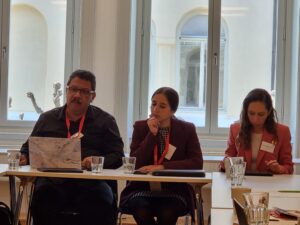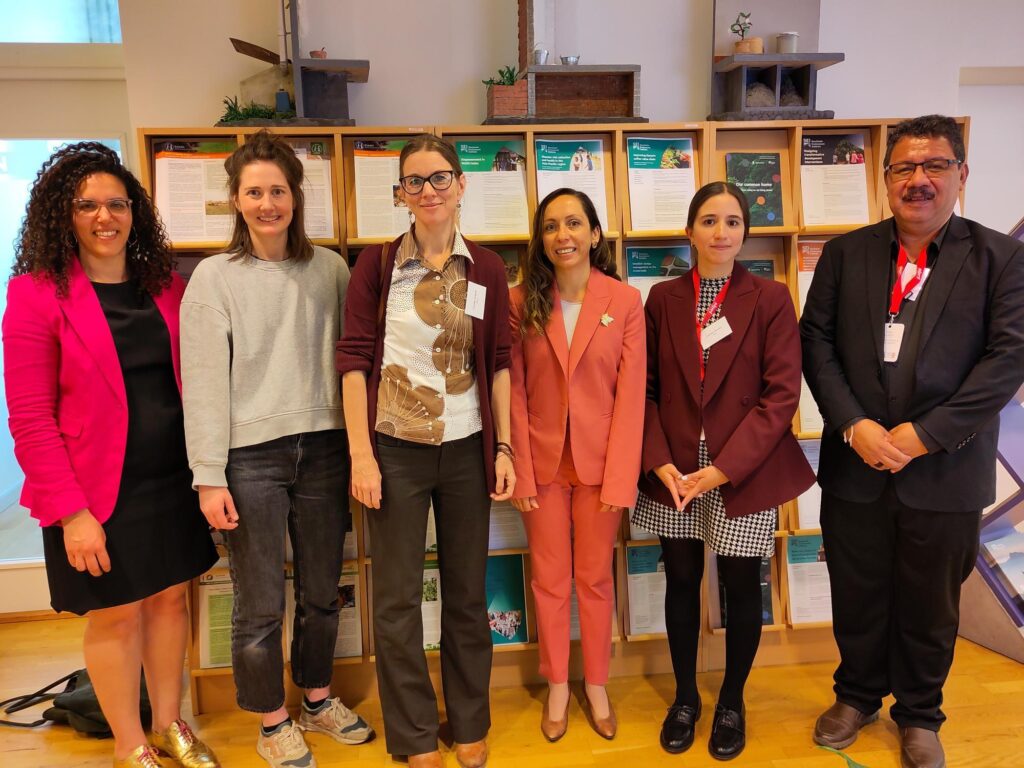Latin America is the world’s most dangerous region for land rights activists and the situation could worsen as the climate crisis escalates. But conflicts are not inevitable, and a SIANI expert group wants to show that it is possible to create virtuous cycles of growing peace and food security. Members of the group recently visited Europe to share their insights.
What is the link between food insecurity and violent conflict? How are local communities in Latin America affected by droughts and increased mining? Which policies could break the current spiral of violence?
Answers to these questions are at the core of the work of SIANI’s expert group on Land Rights in Latin America, and explored in a report Environmental and Climate Justice, and the Dynamics of Violence in Latin America: Perspectives from a Regional Working Group on Climate Change, the Environment, Peace and Security in Latin America.
The group consists of 20 experts from 10 Latin American countries, supported by the Stockholm International Peace Research Institute (SIPRI) and the Friedrich Ebert Foundation (FES). Together, they seek to develop a regional response to the rapidly growing problem of land conflicts, food insecurity and violence. At the same time, the group wants to raise awareness in other parts of the world, not least since decisions made there can aggravate the situation.
Collaboration between Latin America and Europe
Three members of the group recently visited Germany and Sweden to share insights from their report and exchange views with European researchers, organisations and politicians. In Sweden, the trio met with members of the SIANI network. The trip was funded through the SIANI grant.
One of the visitors was Antonia Berríos, a Chilean lawyer representing the organisation FIMA, who appreciated this opportunity:
“It has been very interesting to meet likeminded organisations in Europe and I see how we can enhance our collaboration. It is important to raise awareness of the consequences of environmental conflicts, which can be just as difficult to live with as armed conflicts.”
Her fellow group member Carolina Hildago Herrera from Costa Rica agreed, emphasising that Latin America and Europe have challenges in common, for example how to manage conflicting interests between mining companies and local communities. “People in different parts of the world need a better understanding of the connections between food insecurity, environmental degradation, climate pressure and violent conflict which we describe in our report,” Hidalgo Herrera said.
Worsening food security
The third visitor, Pedro Landa from the International Platform Against Impunity, presented the group’s findings at the 2024 Stockholm Forum on Peace and Development, organised by SIPRI. Drawing on his own experiences as an environmental and human rights defender in Honduras, Landa described an increasingly desperate situation: “There is a lot of pressure on the land from extractive activities like mining, from hydropower, from the cultivation of soy and maize… As a result, pressure is growing on people living there, and their food security is worsening,” he said.
Pedro Landa described the climate crisis as one root cause of the deteriorating situation – rising temperatures cause droughts and floods that reduce crop yields. But he stressed that climate change is only part of the problem; the situation is aggravated by poor governance, unsuitable economic models, social inequality and high levels of violence. Smallholder farmers are evicted from productive land to make room for large-scale food production for export. Another problem is that local seeds have been replaced by expensive imported varieties from international companies.
A different type of development
Landa would like to see a different type of development, less focused on export and with more autonomy for local farmers and communities. He believes this could make smallholders better able to cope with climate challenges and reduce the pressure many feel to migrate. But despite some attempts by Honduras’ current government, little has changed, and the economic elite seems firmly committed to maintaining the status quo.
Asked about the role of other regions, Pedro Landa said that policies in other parts of the world could have major impacts since Latin America is so focused on export. Consumer choices, trade agreements and political decisions in Europe can have unintended consequences for local communities and ecosystems. The report especially highlights how the EU’s green energy transition could put unsustainable pressure on lands and people in Latin America, undermining food security.
But exactly because different regions are so connected, the three Latin American experts saw a need for greater collaboration with Europe and other parts of the world. “A key message in the report is that we can shift to a more sustainable model, but… this gets easier if Latin American countries work together. At the same time, we must collaborate with Europe and others that import our goods,” Antonia Berríos said.
Pedro Landa hoped for more dialogue and listening:
“There are no recipes that can just be copied from one context and used in another, each country is different. I don’t want others to come and tell us what to do, but I want more listening and dialogue, to learn from each other.”
 Read more
Read more
Read more about the group’s findings here: Report calls for a new economic model to address growing food security in Latin America
The full report can be accessed here: Environmental and Climate Justice, and the Dynamics of Violence in Latin America: Perspectives from a Regional Working Group on Climate Change, the Environment, Peace and Security in Latin America.
